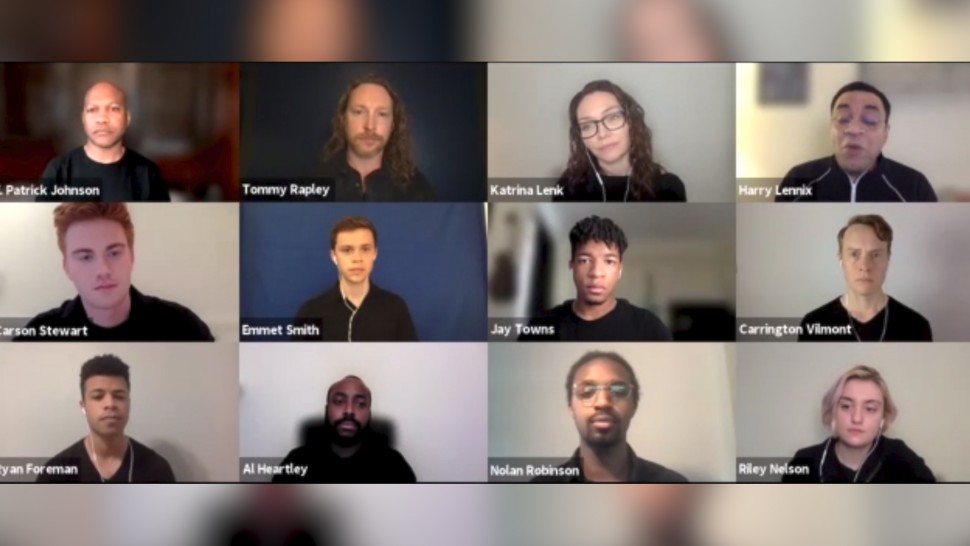Two decades after “The Exonerated” premiered off Broadway, the true stories of six people wrongly convicted and sentenced to death are still as powerful and relevant as the first time they were told.
Thursday night, Northwestern’s Pritzker School of Law and the School of Communication co-presented a new dramatic reading of the play to mark 10 years since the abolition of the death penalty in Illinois and the role the Center on Wrongful Convictions (CWC) had in its overturning.
Broadway and television star, Jordan Donica directed the cast of Northwestern performers. This latest reading featured current students, faculty and alumni including stage and screen star Harry Lennix (C ’86), and Tony Award winner Katrina Lenk, a graduate of Bienen School of Music.
After reading the original script of “The Exonerated” written by Jessica Blank and Erik Jensen, Donica knew this was a project he could not pass.
“I read the play and was immediately affected,” Donica said. “The rawness of these stories, and the obvious innocence of these people remained with me. The lessons to be learned from people who are victims of the [justice] system, are those of patience, sheer will, and faith. These souls are proof that humanity should not have and ultimately does not have the right to place the judgement of death on anyone — let alone an innocent person.”
New, younger characters added
Donica introduces what he calls a “soul-character” to this updated version of the play.
“This particular piece is slightly different than the original in that I added a younger version of each of the exonerees to play alongside their older counterparts. All of these characters have some form of youth intact with them when they were tricked into the system. What interests me is how people stay in touch with their innocence.”
Exonerated man shares his story
Gary Gauger is one of the men whose remarkable story is recounted in the play. The Center on Wrongful Convictions helped overturn his conviction in 1996. The Illinois man was falsely accused and convicted of murdering his parents. Gauger spent less than 4 years in prison and nine months on death row before being released and later exonerated.
In the post-performance discussion moderated by CWC co-director and a professor at Prizker School of Law Laura Nirider, Gauger became emotional and said it was the grace of God that helped him through his ordeal.
“I went into it realizing I’ve got to turn this into a positive experience,” Gauger said while reflecting on his time in prison knowing he was an innocent man. “It was character building. I’m not afraid of too much anymore. It helped me grow up. I feel I am the same person I used to be, but I am more self-centered and empathetic.”
Gauger is now 69 years-old and is an organic farmer. He is also a frequent speaker in the fight to abolish the death penalty nationwide. When asked what it will mean for him when capital punishment is a thing of the past, he responded “It will be about time. An eye for an eye will leave a village blind.”
Collaborative project
“The staged reading of ‘The Exonerated’ reflects the role that art may play in political resistance to effect social change,” said School of Communication Dean E. Patrick Johnson, who performed the story of David Keaton. Keaton was one of five young African American men from Quincy, Florida who were charged with the 1970 murder of a deputy sheriff. They were all exonerated and pardoned in 1972.
Dean Johnson said “As an artist and scholar, it was a privilege to be able to be a part of an historic event. The collaboration between the Center on Wrongful Convictions, the Pritzker School of Law, and the School of Communication’s faculty, students, alumni and staff speaks to the natural synergies among social justice, the law and artistic practice.”
Current and former School of Communication students who performed in the reading include Nolan Robinson (’21), Riley Nelson (’21), Ryan Foreman (’20), Carson Stewart (’21), Emmet Smith (’21), Jay Towns (’22), Emiley Kiser (’21) and Scott Mikita (’88) and Jim Weitzer (’96). Bienen School of Music alumnus Carrington Vilmont (’00) also participated.
“The Exonerated” is not the only connection Jordan Donica has with the Center for Wrongful Convictions. Last fall, he released a music video in support of the Center, Black Lives Matter and the Innocence Project. In the video, Donica covers “If I Loved You” from “Carousel” while acting the role of a Black youth who has been detained by the police.
“The mission of this performance is a celebration and reflection,” Donica writes in his director’s note. “The Center for Wrongful Convictions does tireless work to not only exonerate those on death row who are innocent, but to abolish the penalty of death. ‘The Exonerated’ has a long and storied history of being performed to help spark the conversation around wrongful convictions and the death penalty.”
More work to do
Currently, 27 states and the federal government still allow capital punishment. On March 24, 2021, Virginia became the latest state to abolish the death penalty, and the first Southern state to do so.
The CWC first organized a performance of the “The Exonerated” in 2002 for then-Illinois Governor George Ryan. In 1999, Ryan issued a moratorium on executions in Illinois. A few weeks after seeing the play, Ryan commuted the death sentences of all the inmates on Illinois’ death row – more than 160. The moratorium and the mass commutation eventually led to the abolition of the death penalty in Illinois on March 9, 2011.
To date, 185 former prisoners have been exonerated across the country.


